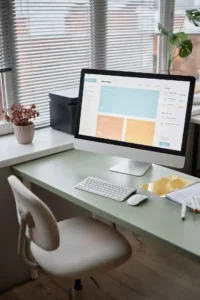The Best Home Office Design for Remote Work
Home Office Design for Remote Work: Why It Matters More Than Ever
Remote work has transformed how we approach daily routines, and the need for an efficient, functional home office has never been greater. Whether you’re working full-time from home, freelancing, or managing a hybrid schedule, the right home office design for remote work can dramatically boost your productivity and well-being.
This guide explores everything from layout and lighting to ergonomics and tech, all geared toward helping you craft the ultimate remote work setup—regardless of your space or budget.
1. Start with a Dedicated Home Office Space
Separate Work from Home Life
Having a defined home office helps your brain switch into “work mode.” It also minimizes distractions, especially in a shared living space. If you don’t have an entire room, consider:
- A corner desk in the living room
- A repurposed closet (“cloffice”)
- A basement or attic nook
- A fold-out or Murphy desk in a bedroom
Visual and Spatial Boundaries Help
Use physical or visual dividers to define your work zone:
- Bookshelves, curtains, or partitions
- Area rugs to visually separate your workspace
- Lighting or color schemes that differentiate your office from home areas
2. Design for Comfort and Ergonomics
Choose an Ergonomic Chair and Desk
An ergonomic setup supports good posture and long-term health. Look for:
- Adjustable chairs with lumbar support
- Desks that fit your height or offer sit-stand functionality
- Keyboard trays or laptop risers to reduce strain
Personalize for Comfort and Efficiency
- Add wrist rests or a footrest
- Adjust monitor height to eye level
- Keep items you use daily within reach to reduce unnecessary movement
Get ergonomic tips at Mayo Clinic’s Office Ergonomics Guide
3. Maximize Productivity with Smart Tech
Must-Have Devices for Remote Work
The best home office design for remote work includes smart tech that enhances productivity:
- Dual monitors or ultra-wide monitors for multitasking
- High-speed internet connection and Wi-Fi extenders
- Noise-canceling headphones
- An external keyboard and mouse
Apps and Software for Focus
- Use time-tracking tools like Toggl or Clockify
- Try focus apps like Forest or Pomofocus
- Task managers like Trello, Notion, or Asana help stay on top of projects
4. Let There Be Light—And Lots of It
Prioritize Natural Light
Natural light has been linked to improved focus and mood. Position your desk near a window if possible.
If natural light is limited:
- Use daylight-simulating LED bulbs
- Add desk lamps with adjustable brightness
- Avoid overhead fluorescent lights that cause glare and fatigue
Choose the Right Color Temperature
- Cool white (4000K–5000K) for focus
- Warm white (2700K–3000K) for relaxation
- Smart bulbs can switch depending on the time of day
5. Keep It Organized for Mental Clarity
Reduce Desk Clutter
Visual clutter leads to mental clutter. Use:
- Cable organizers
- Desktop organizers and drawer units
- Monitor risers with built-in storage
Plan a Weekly Reset
- Clear your workspace every Friday
- Refile papers, remove trash, and disinfect surfaces
- Resetting helps you start the next week with a clear mind
Learn more about desk organization at The Container Store
6. Add Personal Touches for Inspiration
Make It Yours
Incorporating personality into your workspace keeps you motivated:
- Add a vision board or inspiring quotes
- Display personal mementos, awards, or plants
- Choose a calming color palette that energizes you without distracting
Embrace Biophilic Design
Bringing nature indoors can enhance creativity and reduce stress:
- Potted plants or succulents
- Wooden accents or nature-inspired art
- A desktop fountain or natural textures
7. Design Solutions for Small Spaces
Think Vertically
Make use of vertical space with:
- Wall-mounted shelves
- Hanging file systems
- Magnetic whiteboards or pegboards
Opt for Multi-Use Furniture
- Use a fold-out desk or table
- Choose a filing cabinet that doubles as a printer stand
- Try under-desk storage carts or rolling cabinets
Explore more space-saving furniture at Wayfair
8. Establish Work-Life Boundaries
Create a Start-and-End Ritual
- Light a candle when you start your workday
- Shut down your computer and tidy up when you’re done
- Avoid checking emails after hours
Separate Work and Personal Devices
- Use a dedicated work laptop if possible
- Disable work notifications during personal time
- Maintain digital hygiene to avoid burnout
FAQs About Home Office Design for Remote Work
How much space do I need for a home office?
Even a 3-4 ft wide desk and chair can work well.
The key is separating the space visually and functionally from other living areas.
What’s the best color for a home office?
Soft blues, greens, and neutrals are calming and help with focus.
Avoid overly bright or saturated colors that may cause distraction.
Should I work in the bedroom?
Only if space is tight—and never from bed.
Use a small desk or table and face away from the bed to avoid blurring boundaries.
Final Thoughts
The best home office design for remote work blends functionality with comfort. Whether you have a sprawling spare room or a cozy corner, intentional design choices can dramatically improve your productivity and work satisfaction.
From ergonomic furniture and optimal lighting to personalized touches and smart tech, a well-designed home office empowers you to thrive in your remote role. Start small, adjust as you go, and build a space that reflects both your professional goals and personal style.
Need Help Getting Started?
Explore Homebuyer Assistance Programs to learn how to find the perfect home with space for a dedicated office and access exclusive tools and tips for first-time buyers adapting to the remote work lifestyle.







.png)